
| Prohibited Thought | 2,500 Years of Religious Oppression | The Fear of God | School Yard Bullies | Prohibition in the 1900s | Legalization or Bust! |
Top of Page | Beginning of Sub-chapter
Top of Page | Beginning of Sub-chapter
|
One of the dominant trends in the application of prohibition, and apparently in the evolutionary process of humanity, has been the occasional mass killings of peaceful, highly intelligent, spiritual beings. Men periodically killed, imprisoned, exiled or condemned everyone who attained a high state of spiritual awareness, who sought methods of expanding conscious awareness, preached openly about truth-or during some periods in time, in private as well-about mystical euphoria, or who displayed control or knowledge of any unfamiliar powers. One practice repeated by conquerors throughout time is to capture a few knowledgable women from defeated cultures to acquire information about their native practices using a variety of sometimes cruel methods. Many still use the words history and mankind to represent the past and today, for as we know and understand these words they describe the story of the ruling men who wrote and defined the past according to their terms. In all likelihood, it was women who created the art of written communication in the form of pictures and hieroglyphics, which can be easily written in the dirt or sand, hardened permanently in clay, or carved in wood or stone. Men quite probably learned this ability to communicate with pictures from women and then used this skill to dominate and enslave with laws, trade and religious indocrination. Male-dominated societies have learned to control the population by manipulating the words used to describe the past, thereby directing attention towards glorified hereos instead of relevant trends in culture. Since the formation of the Roman Catholic Church, prohibition, in many forms, became rampant. While the prohibiton of worshipping different deities and using some substances has probably been recurring for thousands of years within a broad range of different, unconnected cultures, we can be especially critical of the Roman Catholic Church because it is so well documented, recent in historical terms, and still prevalent in today's society. The severe oppression brought upon it's membership was only shadowed by the murderous genocide the clergy periodically directed towards other non-Christian societies. The art of writing and reading was restricted to a select few who were sanctioned by the church to conceal, destroy or rewrite history according to the beliefs and principles of the Church and the Pope. Sexual behaviour was seen as unclean, unless for the sole purpose of procreation, with young girls being strongly encouraged if not forced to stay a virgin until marriage. As the old idols and worshipping areas were destroyed, ancient teachers killed or imprisoned, their writings and teachings destroyed forever, deities disappeared from the living memory of peoples. Language and myth was manipulated by the church with the creation of songs, parables, meditations and prayers. The concepts of Heaven and Hell was used to scare both church members and unbelievers into thinking that their after-life depended on the judgment of the Christian God upon death, and that only by following Jesus, repenting their sins and casting away doubt of God and His wisdom could one attain Eternal Life. The Devil, the enemy of God, uses women to corrupt mankind, and some were accused of sleeping with the ancient serpent to attain knowledge which God had wanted to protect. This God of the Roman Catholic Church is a jealous god, one which does not want humanity to attain full self-realization, and as such God has inspired many men to commit murder and other atrocities against those who persist to investigate in areas of knowledge which the Church does not condone. The fear of God is put into the hearts and minds of every good Christian on Earth since the day they are born, and this fear convinces many that it is far better to obey than to rebel. While preaching the love of God and/or promising to consider the needs of the poor, Kings, bishops, priests and Popes have committed unspeakable crimes against their own followers and especially other faiths. The interpretation of the Bible has lead to hundreds of arguments, fights and wars, something which still continues. Many indigenous peoples around the world were slaughtered, enslaved or assimilated under the direction of the Roman Catholic Church during these past two thousand years. It would take a long book just to describe all of the atrocities that have been committed by Christians in the name of God, and what actually happened would be so sickening it would be very disheartening to know. |
Top of Page | Beginning of Sub-chapter
|
The classroom should become the place where teachers have an open, honest discussion about the positive and negative effects substace use has upon an individual's health, social orientation and spiritual development. As long as the conversation is focused upon moral and immoral choice of substances, instead of being centered upon healthy patterns of substance use, we will continue to experience problems with substance abuse, especially with legal drugs like alcohol and prescription pills. By teaching youth to respect their bodies by waiting until they are physically and mentally mature before experiencing non-ordinary reality, we will be reinforcing behaviours which are responsible, healthy and respectful of one's abiltiy to make intelligent choices. While most people will admit that the War On Drugs is wrong, there is a fear that the alternative- the legal use and distribution of mind-altering substances- will give youth access to harmful substances, which they will make poor choices of consumption and behaviour with. This is the crux of the issue for many people. Parents need to realize is that the War On Drugs gives people addicted to cocaine and heroin the incentive to give youth free or cheap drugs so they will become hooked, life-long customers. The legal distribution of all substances will reduce crime dramactically, nurture the development of positive patterns of substance use and allow our society to interact based upon practiced ideals of tolerance, respect and freedom. By giving illegal organizations a virtual monopoly in the unregulated supply and distribution of some expensive, powerful mind-altering substances through the government policy of prohibition, we are combining two very dangerous factors: drug use and violence. When drugs are only available on the black market, the substance is often mixed with harmful chemicals, and because some addictive drugs are so expensive, addicts use the most effective method of maximizing the high they can recieve for their money. This causes many addicts to use needles when getting high, increasing the chances of death from overdose and/or contracting a disease. Violence becomes a huge factor in this senario created by prohibiton because the more addictive drugs like cocaine and heroin are only available from large criminal organizations who are willing to commit serious crimes like murder, kidnapping, extortion, torture and theft to protect their economic and political interests. Also, many people addicted to cocaine and heroin resort to violence to obtain the cash to support their habit. Prohibition takes away from a person's dignity since the State has decided that a few people cannot control their use of some substances, then no one should be allowed legal access to them. When repect is shown towards our youth and tax-payers which credits them with having the intelligence to make healthy, proper choices regarding the substances they use, then, and only then, will we begin to see some dramatic changes in the distrubing patterns we see today under prohibtion. Laws cannot eliminate non-violent action, self-medication or human nature. |
Top of Page | Beginning of Sub-chapter
|
This past century's wave of prohibition was also strongly supported by religious activity, though this time for different reasons than before. Achohol was destroying the lives of many women at the turn of the century. Husbands were coming home late from work, drunk, having spent a great portion of the families earnings, quite often in violent rages. Women's groups in Christian Churches used puritan ideology to force the US government to ban the legal sale of alcohol. The prohibition of alcohol caused many more problems than it was created to contend with. Meanwhile, in China the use of opium had increased to all-time highs. This was loudly condemned by Christian missionaries seeking to convert new recruits. They introduced the drug to the Chinese in the early 1800's, establishing Hong Kong as a smuggling port for opium. Soon after the British created a market for opium in China, other groups became involved in the trade. Chinese warlords began forcing peasants to grow more poppies than food, often paying mercenaries in opium. Early this century, Japanese became involved in the industry because the profits were high and the use of opium was seen as a means to make the Chinese docile and lazy so they would submit to eventual assimilation by the Japanese. People began growing opium around the world, transporting the drug to China or any other large city with a sizable Chinese population. Eventually the practice of smoking opium spread throughout the world, with many respectable monarchs and politicians indulging openly. However, this century saw a change in attitude towards opium. After anti-Asiatic riots in 1907 in Vancouver's Chinatown, Mackenzie King visited Canada's coast to review the situation. In 1908 he introduced the Opium Act which prohibited the manufacture and sale of opium, and it's derivatives morphine and heroin, without expressed consent from the government for medical reasons. These laws were used to arrest Asians when local authorities felt the desire to impose their will upon defenseless minorities. While many Asians in North America did use opium before prohibition, they did not commit crimes, generally speaking. That is, not until the violent enforcement of the laws forced the prices of pure heroin artifically high. In 1911, King introduced legislation to include cocaine on the schedule of prohibited drugs and to consider the simple possession of an illegal substance to be a criminal offence. Religious puritans, fledgling pharmapeutical companies, racists, lawyers, police, and black market entrepenuers had huge incentives to support prohibition, while women's groups wanted substance abuse and violence stopped. In 1919 in the USA, the 18th Amendment prohibited the sale, manufacture or distribution of alcoholic beverages, an action which turned respectable, honest citizens into criminals because they choose an alternative source of relaxation. Bars turned into lawless, underground drinking holes, with shoot-outs and robberies occurring continually between rival bootleggers. Organized crime immediately became the most feasible occupation for many people, as the excitement of breaking the law and earning a lot of money drew in aimless youth. The alcohol itself was completely unregulated, causing blindness and even death due to poor quality or tainted products. By the time alcohol was reintroduced to the market on Dec 6, 1933, large gangs of criminals owned legitmate businesses which they created to launder illegally obtained money through. Though alcohol abuse is still a very serious issue today, it could be greatly countered, in my opinion, if marijuana were legally available. Eventually in 1933, politicians in the White House realized that prohibition of alcohol was caused far more problems the legal control of the drug, despite the fact that many still wished to control the public's experimentation with altered states of consciousness. Today, liquor continues to be a far more harmful drug than marijuana, both in terms of the physical and psychological damage done to the individual's body after prolonged use of alcohol, and in terms of the social costs beared by the society because of abuse. In 1988, for example, 48 000 USA citizens died directly from alcohol abuse, as compared to 3 000 people who died from the abuse of illegal drugs, none of which were a result of marijuana use. Alcohol, though, is the favorite tool of the establishment to subdue and discourage the public from rediscovering their connection to Mother Earth. The main reason legislation attacking the cannabis culture was passed was because of the economic entities which felt threatened by hemp. "Reefer Madness" was the term most commonly used to describe the campaign waged against marijuana, and the public was motivated into action with false information, racist accusations and religious pressure. Images of non-white rapists wandering the streets in violent rages while under the influence of marijuana were drilled into the public's mind. Poverty was blamed on the drugs ability to relax the mind and ease the daily discomforts in life, turning the lower classes into lazy, unproductive slackers pulling down society. The Hearst Newspaper Company, the largest newspaper chain in North America, had heavily invested in the timber industry to maintain a constant supply of cheap wood-pulp. In general the media has always been owned by people who desire to control the conscious behaviour of the multitudes, and prohibition quickly became a favourite theme of editorials and the acclaimed drug of choice for murders. The people behind this slanderous campaign completely deceived the public as to the true intentions behind these laws, and the repercussions of this campaign are still very apparent today. In the USA, the Pure Food And Drug Act of 1906 was the first set of laws written with the intention of regulating cannabis, along with other mind-altering substances. The Harrison Act of 1914 was intended to tax and strictly regulate the use of cannabis, though only opium and coca products became controlled with this legislation. The first laws of this century prohibiting the distribution of cannabis by pharmacists were passed in the Louisiana legislature in 1911. The cities of El Paso, Texas and New York passed laws banning the possession of cannabis in 1914. By 1923 many states had passed laws prohibiting the use of cannabis. The Marijuana Tax Act was introduced 7 years after the Federal Bureau of Narcotics was created in 1930. When Harry Anslinger began his campaign to eradicate cannabis as head of the Bureau, 16 states had mild laws prohibiting the use of marijuana. By 1937, though, Harry Anslinger had convinced everyone that marijuana was a dangerous drug which had to be eliminated. Since the cannabis culture was only prominent in poor, black communities in larger societies like Chicago, no pot smoker could defend their rights and freedoms. It was a reoccurrence of the suppression of blacks, a step taken by certain religious, economic and political forces in government because some free black people had gained money, power and respect in some areas of the country. This threat was to be controlled by prohibiting the use of marijuana, a herb used by most radical black organizations and musicians, and many were arrested for possession. Numerous false stories were circulating during these times concerning the horrible affects of marijuana smoking were obviously directed at blacks, Hispanics and the poor. This form of propaganda is still used today, though it is being disproved time and time again. In 1938 a number of arrests were made, with huge piles of confiscated pot being burned for the media to watch. Most arrested were visible minorities. Since the main goal of the program was actually to eliminate hemp, these arrests were never serious attempts at stopping the use of marijuana. Up until recently, that plan has been successful, with the media still creating confusion about the issues to stall the reintroduction of cannabis. Though we will discuss this further in the chapter on the revival of cannabis it is worth noting here that we owe the return of marijuana and hemp in part to the USA government. For it was during the 1940's and 1950's that the White House began secretly conducting all sorts of weird tests upon criminals, mentally and physically handicapped, students, volunteers and soldiers, some of which involved experimentation with LSD. These experiments, combined with a renewed interest in the ancient, aboriginal use of psychoactive drugs and medicinal herbs, lead to an intellectual whirlwind of exciting possibilities. Many rebels in the 1950's, and even 40's, smoked pot in an act of defiance. Then, after the public drug experimentations of the 1960's, the hammer came down. Students were killed at rallies, drugs were confiscated, offices were raided, protesters were arrested, books were burned, anarchists disappeared and the revolution was temporarily shut down by the military, with the full support, of course, of the media and general public. Everything the White House did with it's military right was justified and sanctioned by Manifest Destiny. Since the large majority of the USA population was completely unaware of the numerous breeches of trust that their government was committing, they joined in the persecution of the disidents, throwing family members out of there homes, reporting neighbours to the police and discriminating against long-hairs, feminists and blacks because they choose to challenge the established order. Those who continued to oppose the government were imprisoned, killed, silenced under threat or by violence. Some got smart and ran to beautiful British Columbia to grow pot. The War On Drugs being lead by the United States is the banner ignorant consumers and corrupted opportunists have placed their forces of hate and destruction under. Although the cannabis culture is not currently subjected to the slaughters and mass hysteria that has occurred in other times and places, or at least not here in Canada, cannabis smokers are still being arrested, murdered, beaten, robbed, insulted, discredited, exiled from certain social groups and activities, and blamed for all sorts of social and economic problems and crimes. This is nothing new. It never has, nor will it ever, stop the truth from being revealed from within the hearts and minds of those ready to receive the gift of life, light and love which is for ever with those who have bonded with Mother Earth through cannabis. The divine power within each of us is what the anti-humans fear. Their jealousy has erupted in rage whenever they perceive that someone might actually contain more pure energy force, in terms of physical or mental willpower, than they could comprehend. The people behind the War On Drugs have every reason to believe that they can continue to get away with corrupt business practices which have maintained world governments and economies for thousands of years. International corporations have effectively gained control, behind the scenes and in the streets, of almost every country in the world. Mega-rich family of monarchs and land owners have no idea that a mass transformation of human awareness is occurring, with the full intention of completely change every aspect of their lifestyle. They are so wrapped up in their private world of luxury cars and private resorts, are completely convinced of the extent of there control over the mass population, they cannot comprehend a world where everyone is treated equally, within the law and society, because such a cultural transformation would endanger their way of life. Hence, they continue to exert massive amounts of money and resources towards the manipulation of the populace, from public education, to newspaper and magazine articles, to presidential speeches. The few who live within this upper class society who truly wish to help the world are usually completely lost because they are surrounded by a host of money-hungry, disillusioned people. The grip of the wealthy upon the world seems secure. |
Top of Page | Beginning of Sub-chapter
|
Many people oppose prohibition and the War on Drugs, not because they find any inherent value in the drugs themselves, but because of the serious, documented problems which result from the illegal drug trade. The number of cocaine and heroin overdoses would be reduced significantly if they were available over the counter, by doctor's prescription only, because users would get clean needles, and the drug's purity and potency could be regulated. The high costs of these powerful drugs causes addicts to take extreme risks to pay for their habit. Black market heroin, for example, has risen at least five thousand times the hospital costs. A study done in 1992 suggests that the annual cost of drug abuse born by society in Ontario alone was $500 million dollars. This figure which could not possibly include all of the real costs felt by citizens from the War On Drugs. The crime that occurs everyday because of prohibition is apparent every night on the six o'clock news. Prohibition is an evil in our culture which must be eliminated soon before the inner-cities self-destruct. The narrow-minded, simplistic approach of imposing a universal ban on some plants or drugs is doomed. We have allowed an insane "WAR ON DRUGS" to infect our society with no real proof that these substances, when used properly, have any significant negative impact upon those using the substances or upon society as a result. Prohibition creates far more problems than it attempts to solve. After a young person smokes a joint, they realize the lies that have been told to them at school, home and on television about the effects of pot. They quickly begin to distrust other government programs, history as they were taught it, and society in general. The people they should be looking towards as role models- police, politicians, teachers, parents and journalists- become the people most responsible for the ignorance and apathy which dominates Western society. Canadians want the war on cannabis to end. In an 1997 Angus Reid Group survey 51% of those questioned said they supported decriminalization, while 45% believe that marijuana should remain illegal. However, only 27% of those who think marijuana should be illegal believe that those use smoke pot for medicine should still be penalized. This means that only 17% of Canadians are in full support of the War On Drugs, the rest either being undecided, totally opposed or somewhere in between, depending upon their personal best interests. The Federal Minister of Health, Allan Rock, knew very well that 83% of Canadians were in favour of medical marijuana last June when he announced that Health Canada was prepared to begin considering cannabis as medicine. What he did not tell everyone is that he was forced to make these concessions because Jim Wakeford took the government to court for denying him access to the only medication has keeps him healthy. Decriminalization has been discussed by some as an alternative to harsh penalties for drug users. The argument is that by arresting the producers, smugglers and dealers of illegal drugs, we can stop the flow of drugs to the street, which combined with proper education, will eradicate the use of drugs considered by the State to be dangerous. Harsh penalties for supplying people with illicit substances will deter anyone from dealing drugs, according to the decriminalization argument. This softer approach is embraced by those who do not use illegal sustances themselves, but have a difficult time themselves supporting the War On Drugs. It serves many other beneficial purposes for others.
In fact, the Fraser Institute published an article called, The Costs Of The War On Drugs, by Richard Stevenson, in the June 1998 edition of the Fraser Forum, claims that 8% of world trade is in illegal psychoactive drugs. That is a huge amount of money being filtered through our banking systems around the world every day. Many smaller countries throughout the world have created loose banking laws to attract people with cash that cannot be invested in countries like Britian, the U.S.A. and Canada, without scrutiny from Revenue Canada, or the equivalent thereof. For example, the Cayman Islands has 1 bank for every 49 people, a statistic which clearly points to the fact that thousands of bank acounts which store drug profits exist in many small countries. Even the banking systems in countries like Canada have become comprised by the drug trade since the profits are too large to ignore when individual bankers are convinced about the benefits which they can receive by assisting some people filter drug money into the financial system. It is estimated that the current illegal drug market in the world is valued at $500,000,000,000 per year. The huge profits available to those who control the production and distribution of these substances is an incredible incentive for everyone from lawyers to bankers, to the politicians who support them, to keep drugs illegal. The policy of decriminalization allows people willing to commit violent crimes to protect their market with a virtual monopoly in the most lucrative, tax-free industry in the world. Ironically, while lawyers writing lies may have been the original foundation of prohibition, the courts may be the final burying ground for these laws. In Canada, for example, the government, under the leadership of the pot-smoking Pierre Trudeau, has created a document called the Charter of Rights and Freedoms which is being used by activists like myself to argue that the laws are unreasonable, arbitrary and malicious. The Charter enshrines the rights of the individual against the rights of the state, and this is where the laws ultimately fail. For just as the state has no right to enter the bedroom, it has no right to enter the minds and bodies of it's citizens by prohibiting mind-altering substances. Legalization of all illicit substances would generate a great number of positive results around the world. While we realize that this will not happen everywhere at once, this is the goal of many people such as myself. Medical marijuana is slowly unraveling the War On Drugs in America, a process which is taking far too long for some, but will no doubt end with the legal use and distribution of marijuana for the purposes of medicine. As the information spreads regarding why cannabis was made illegal in the first place, people will denounce the conspiracy. As the environment gradually deteriorates, which has suffered from our neglect and overconsumption, people will rise up to defend our planet from gross industrialization. As our friends, neighbours and family members die from overdose deaths, we will scream for justice. Legalization of all drugs would solve many problems with crime, environmental degradation, substance abuse and economic uncertainty. Since 8% of world trade is not counted, a huge sum of money is excluded from the economy. The injection of revenue governments would receive from the legal sale of cannabis alone would dramatically reduce the deficit, increase the tax base, creating legitimate jobs, businesses and new forms of entertainment. Today, many upper-class people have began to realize that the existing social power structures which were created to control the economic, religious and sexual urges of society have failed. Many need look no further than their own families to see the negative effects repressive rules have, as some youth go off the deep end as soon as they taste freedom. Those in government right now know that prohibition and the War on Drugs, especially marijuana, is lost, but they do not have any idea of how they could legalize the medicinal use of marijuana or the industrial use of hemp without completely blowing the lid off the entire business and government conspiracy. While many will admit the War On Drugs is a failure, the idea of legalizing, especially drugs like cocaine, is very intimidating. This uncertainty about the future which many people share today can only be calmed by continuous rational action by those making decisions regarding health programs, consumer spending, public policy and educational reform. The end of the War On Drugs is a goal worth struggling towards in this drive to create a better future. |
Top of Page | Beginning of Sub-chapter
Copyright 1996 by Leon Smith
Click here for copyright information
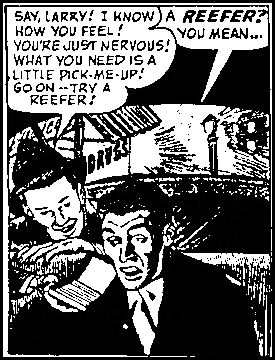 While
it is hard to prove when cannabis became a daily part of human life,
it is equally as hard to say when opposition began to THC-induced
experiences of altered states of awareness. It might be safe to
say that it was when men created laws over women to gain control
over the population that prohibition, and many other forms of institutional
pyschological and physical violence, began. These rules were imposed
upon women and slaves who were considered inferior in intelligence,
skill and spirituality. Most of the original man-made laws were
probably not directed specifically towards the suppression of plant
worshipping or the use of cannabis. However, the last 2,500 years
has seen a series of waves of violently enforced prohibition laws
While
it is hard to prove when cannabis became a daily part of human life,
it is equally as hard to say when opposition began to THC-induced
experiences of altered states of awareness. It might be safe to
say that it was when men created laws over women to gain control
over the population that prohibition, and many other forms of institutional
pyschological and physical violence, began. These rules were imposed
upon women and slaves who were considered inferior in intelligence,
skill and spirituality. Most of the original man-made laws were
probably not directed specifically towards the suppression of plant
worshipping or the use of cannabis. However, the last 2,500 years
has seen a series of waves of violently enforced prohibition laws The
first documented wave of violently enforced prohibition of worship
of deities other than Yahweh occurred in Jerusalem in 621 B.C. The
Jews had just gained control of Jerusalem, with some returning from
Assyria, whose people worshipped the Tree of Life, where they had
been held as slaves for years. A fanatical sect had developed over
time within the Jewish community which professed that Yahweh alone
should be worshipped, all other gods and goddess' being false and
impotent. It fact, they claimed, it was because the Jews paid tribute
to so many deities other than Yahweh that the Jewish peoples were
defeated and taken from their homeland in the first place.
The
first documented wave of violently enforced prohibition of worship
of deities other than Yahweh occurred in Jerusalem in 621 B.C. The
Jews had just gained control of Jerusalem, with some returning from
Assyria, whose people worshipped the Tree of Life, where they had
been held as slaves for years. A fanatical sect had developed over
time within the Jewish community which professed that Yahweh alone
should be worshipped, all other gods and goddess' being false and
impotent. It fact, they claimed, it was because the Jews paid tribute
to so many deities other than Yahweh that the Jewish peoples were
defeated and taken from their homeland in the first place.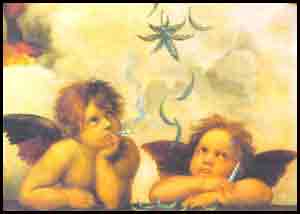 Female
dieties and women were given credit in ancient times for discovering
wisdom and knowledge, as well as with having the spiritual capabilities
to communicate with Nature. In a complete reversal of thinking,
women were blamed by the Roman Catholic Church for having created
evil, or at least man's awareness of evil, and therefore had to
be controlled by men for the good of humanity. While it is difficult
to speculate why individuals like Peter and Paul held such negative
views of women, there can be no doubt that their insatiable quest
for power was to set the standard for other fanatics to use Christian
dogma as a means to gain influence and prestige. Women became an
easy target for those looking to blame all of the world's ills upon.
Female
dieties and women were given credit in ancient times for discovering
wisdom and knowledge, as well as with having the spiritual capabilities
to communicate with Nature. In a complete reversal of thinking,
women were blamed by the Roman Catholic Church for having created
evil, or at least man's awareness of evil, and therefore had to
be controlled by men for the good of humanity. While it is difficult
to speculate why individuals like Peter and Paul held such negative
views of women, there can be no doubt that their insatiable quest
for power was to set the standard for other fanatics to use Christian
dogma as a means to gain influence and prestige. Women became an
easy target for those looking to blame all of the world's ills upon.
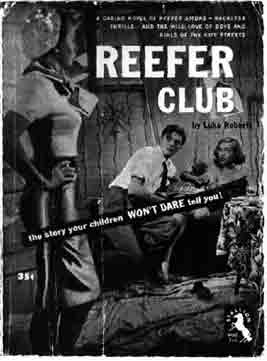 Public
education became a favorite tool of prohibitionists to force their
will upon the masses soon after it's creation. The early universities
in England and France in the 1200 and 1300's were created by people
who wanted to wrestle the authority of confirming the legitimacy
of knowledge, science and law away from the church and monarchy.
After hundreds of years of restriction in academic and scientific
exploration, the Renaissance of the sixteenth century opened the
gateway to knowledge and wisdom kept secret for over one thousand
years. A renewed interest in ancient knowledge generated a resurgence
of creative thought and art, especially in the upper class. For
the first time in a long while, intellectuals not affiliated with
the Church became prominent figures in the State and society. However,
the efforts of these enterprising men were quickly channelled towards
empowering the wealthy.
Public
education became a favorite tool of prohibitionists to force their
will upon the masses soon after it's creation. The early universities
in England and France in the 1200 and 1300's were created by people
who wanted to wrestle the authority of confirming the legitimacy
of knowledge, science and law away from the church and monarchy.
After hundreds of years of restriction in academic and scientific
exploration, the Renaissance of the sixteenth century opened the
gateway to knowledge and wisdom kept secret for over one thousand
years. A renewed interest in ancient knowledge generated a resurgence
of creative thought and art, especially in the upper class. For
the first time in a long while, intellectuals not affiliated with
the Church became prominent figures in the State and society. However,
the efforts of these enterprising men were quickly channelled towards
empowering the wealthy. 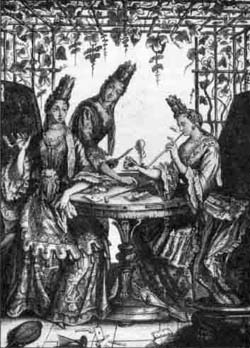 After
the French Revolution of 1592, the Church and monarchies of Europe
reorganized to maintain a tight grip upon the populace, but the
damage done to the credibility of these power structures could never
be completely repaired. It was in the 1800's when the State began
to formally take control of the education system from the Church
for several different purposes. The main reason behind this move
was to create better citizens for the State. This meant perfecting
techniques of manipulation and deceit which the Church had used
to subdue it's membership from birth. The education system also
serves to further separate youth from spiritual connections of any
kind, distracting young, active, intelligent minds from the practice
of studying any philosophy or ideal which does not serve the purpose
of State. Furthermore, with control of the education system, the
State has the power to manipulate productive young people from the
general population to turn them into tools of the machine. This
consumer slavery to which most people submit is very effective in
disguising it's exploitative nature behind fast cars, controversial
movies, new technology and flashy games. The United States is definitely
the most successful country in this conspiracy of economic enslavement,
having formed the largest military force, biggest Stock Exchange
and the most ignorant population in the world.
After
the French Revolution of 1592, the Church and monarchies of Europe
reorganized to maintain a tight grip upon the populace, but the
damage done to the credibility of these power structures could never
be completely repaired. It was in the 1800's when the State began
to formally take control of the education system from the Church
for several different purposes. The main reason behind this move
was to create better citizens for the State. This meant perfecting
techniques of manipulation and deceit which the Church had used
to subdue it's membership from birth. The education system also
serves to further separate youth from spiritual connections of any
kind, distracting young, active, intelligent minds from the practice
of studying any philosophy or ideal which does not serve the purpose
of State. Furthermore, with control of the education system, the
State has the power to manipulate productive young people from the
general population to turn them into tools of the machine. This
consumer slavery to which most people submit is very effective in
disguising it's exploitative nature behind fast cars, controversial
movies, new technology and flashy games. The United States is definitely
the most successful country in this conspiracy of economic enslavement,
having formed the largest military force, biggest Stock Exchange
and the most ignorant population in the world. 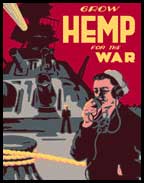 Today,
the classroom has become a battlefield upon which the War On Drugs
is fought every day. Children in schools are being encouraged to
turn their parents in for smoking marijuana, not realizing that
they could be taken away from their families by the state if their
parents are suspected of having a drug problem. Drug search teams
force students out of classrooms while dogs sniff lockers and desks
for illegal substances. Lies about the negative effects of drug
use are constantly driven into the heads of youth who will quite
often find out later in life that smoking pot isn't nearly as bad
as they were told. The conversation about drugs is being brought
to our youth at younger and younger ages, stimulating thought about
subjects which ideally should not be considered until a later age
when their body is mature enough to absorb the substance without
chance of hampering emotional, social or physical development. When
youth are exposed to topics regarding intoxication they are naturally
curious about the experience. After a young person smokes some pot
they realize that they have been mislead by their elders and begin
to question authority and everything they have been told about other
drugs. This leads to experimentation and irresponsible patterns
of substance use, while creating a wall of mistrust between generations.
Today,
the classroom has become a battlefield upon which the War On Drugs
is fought every day. Children in schools are being encouraged to
turn their parents in for smoking marijuana, not realizing that
they could be taken away from their families by the state if their
parents are suspected of having a drug problem. Drug search teams
force students out of classrooms while dogs sniff lockers and desks
for illegal substances. Lies about the negative effects of drug
use are constantly driven into the heads of youth who will quite
often find out later in life that smoking pot isn't nearly as bad
as they were told. The conversation about drugs is being brought
to our youth at younger and younger ages, stimulating thought about
subjects which ideally should not be considered until a later age
when their body is mature enough to absorb the substance without
chance of hampering emotional, social or physical development. When
youth are exposed to topics regarding intoxication they are naturally
curious about the experience. After a young person smokes some pot
they realize that they have been mislead by their elders and begin
to question authority and everything they have been told about other
drugs. This leads to experimentation and irresponsible patterns
of substance use, while creating a wall of mistrust between generations.
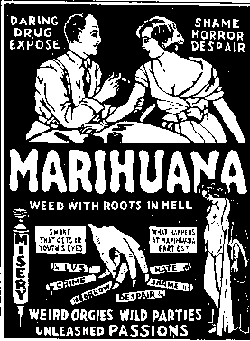 Coffee
was actually made illegal in England for a brief time in the 1600's
because the King believed that the drink was partly responsible
for the discussions about revolution which were occurring in the
coffee houses of the time.
Coffee
was actually made illegal in England for a brief time in the 1600's
because the King believed that the drink was partly responsible
for the discussions about revolution which were occurring in the
coffee houses of the time. 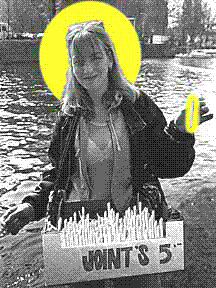 It
is impossible to calculate the cost of prohibition today, or in
the past, because there are so many affected areas within our society
and individual consciousness. To quantify the costs beared by humans
by a result of its submission to such a harsh policy is too difficult.
Of course, on the other side of the coin, it is impossible to calculate
the benefits derived from our connections to cannabis and Mother
Earth. We do not necessarily need to quantify either the costs or
the benefits of the historical process. We need only to understand
our role in the unfolding of the webs of time. In doing that, though,
we need to seriously confront the statistical evidence regarding
the effects of prohibition and male-dominated, hierarchical social/economic
structures which created it.
It
is impossible to calculate the cost of prohibition today, or in
the past, because there are so many affected areas within our society
and individual consciousness. To quantify the costs beared by humans
by a result of its submission to such a harsh policy is too difficult.
Of course, on the other side of the coin, it is impossible to calculate
the benefits derived from our connections to cannabis and Mother
Earth. We do not necessarily need to quantify either the costs or
the benefits of the historical process. We need only to understand
our role in the unfolding of the webs of time. In doing that, though,
we need to seriously confront the statistical evidence regarding
the effects of prohibition and male-dominated, hierarchical social/economic
structures which created it.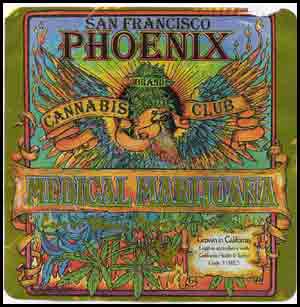 In
my opinion, decriminalization is a lawyer's term for job protection,
as the production, transport and sale of these illegal substances
would still provide jobs for the legal teams, police officers, customs
agents and jail guards, while channelling human and economic resources
into a necessarily criminal world. This policy actually forces
the prices of illegal drugs higher because those taking the risk
to supply the substance demand more cash. This causes the exact
opposite effect that those promoting decriminalization claim to
be striving towards because all of the crimes associated with the
illegal drug market become magnified . With decriminalization the
stigma which is directed towards those who choose to consume what
are currently illegal substances will still be engrained in public
policy, school curriculums and sermons from the pulpit. Under decriminalization,
the state could still force citizens to take urine analysis, forcing
people to submit if they wish to go to school, get a drivers licence,
travel or get a job. Instead of being treated like criminals, pot
smokers would be treated like addicts, being forced into detox programs,
taking cleansing drugs and potentially living under constant surveilance.
The other major problem with this policy is that the enormous amounts
of money which can be made in the illegal drug trade already support
a huge world-wide network of people, who benefit from higher prices
with little personal risk.
In
my opinion, decriminalization is a lawyer's term for job protection,
as the production, transport and sale of these illegal substances
would still provide jobs for the legal teams, police officers, customs
agents and jail guards, while channelling human and economic resources
into a necessarily criminal world. This policy actually forces
the prices of illegal drugs higher because those taking the risk
to supply the substance demand more cash. This causes the exact
opposite effect that those promoting decriminalization claim to
be striving towards because all of the crimes associated with the
illegal drug market become magnified . With decriminalization the
stigma which is directed towards those who choose to consume what
are currently illegal substances will still be engrained in public
policy, school curriculums and sermons from the pulpit. Under decriminalization,
the state could still force citizens to take urine analysis, forcing
people to submit if they wish to go to school, get a drivers licence,
travel or get a job. Instead of being treated like criminals, pot
smokers would be treated like addicts, being forced into detox programs,
taking cleansing drugs and potentially living under constant surveilance.
The other major problem with this policy is that the enormous amounts
of money which can be made in the illegal drug trade already support
a huge world-wide network of people, who benefit from higher prices
with little personal risk.